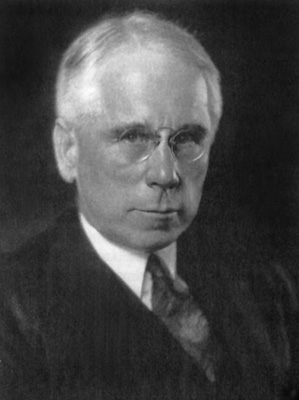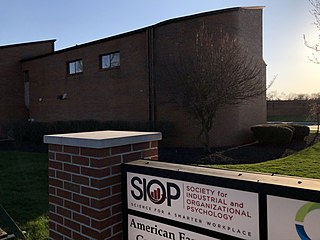Related Research Articles
Industrial and organizational psychology "focuses the lens of psychological science on a key aspect of human life, namely, their work lives. In general, the goals of I-O psychology are to better understand and optimize the effectiveness, health, and well-being of both individuals and organizations." It is an applied discipline within psychology and is an international profession. I-O psychology is also known as occupational psychology in the United Kingdom, organisational psychology in Australia and New Zealand, and work and organizational (WO) psychology throughout Europe and Brazil. Industrial, work, and organizational (IWO) psychology is the broader, more global term for the science and profession.
Psychology is the study of mind and behavior. Its subject matter includes the behavior of humans and nonhumans, both conscious and unconscious phenomena, and mental processes such as thoughts, feelings, and motives. Psychology is an academic discipline of immense scope, crossing the boundaries between the natural and social sciences. Biological psychologists seek an understanding of the emergent properties of brains, linking the discipline to neuroscience. As social scientists, psychologists aim to understand the behavior of individuals and groups.

The American Psychological Association (APA) is the main professional organization of psychologists in the United States, and the largest psychological association in the world. It has over 157,000 members, including scientists, educators, clinicians, consultants, and students. It has 54 divisions—interest groups for different subspecialties of psychology or topical areas. The APA has an annual budget of around $125 million.

A psychologist is a professional who practices psychology and studies mental states, perceptual, cognitive, emotional, and social processes and behavior. Their work often involves the experimentation, observation, and interpretation of how individuals relate to each other and to their environments.
Applied psychology is the use of psychological methods and findings of scientific psychology to solve practical problems of human and animal behavior and experience. Educational and organizational psychology, business management, law, health, product design, ergonomics, behavioural psychology, psychology of motivation, psychoanalysis, neuropsychology, psychiatry and mental health are just a few of the areas that have been influenced by the application of psychological principles and scientific findings. Some of the areas of applied psychology include counseling psychology, industrial and organizational psychology, engineering psychology, occupational health psychology, legal psychology, school psychology, sports psychology, community psychology, neuropsychology, medical psychology and clinical psychology, evolutionary psychology, human factors, forensic psychology and traffic psychology. In addition, a number of specialized areas in the general area of psychology have applied branches. However, the lines between sub-branch specializations and major applied psychology categories are often mixed or in some cases blurred. For example, a human factors psychologist might use a cognitive psychology theory. This could be described as human factor psychology or as applied cognitive psychology. When applied psychology is used in the treatment of behavioral disorders there are many experimental approaches to try and treat an individual. This type of psychology can be found in many of the subbranches in other fields of psychology.
Clinical psychology is an integration of human science, behavioral science, theory, and clinical knowledge for the purpose of understanding, preventing, and relieving psychologically-based distress or dysfunction and to promote subjective well-being and personal development. Central to its practice are psychological assessment, clinical formulation, and psychotherapy, although clinical psychologists also engage in research, teaching, consultation, forensic testimony, and program development and administration. In many countries, clinical psychology is a regulated mental health profession.
Together, legal psychology and forensic psychology form the field more generally recognized as "psychology and law". Following earlier efforts by psychologists to address legal issues, psychology and law became a field of study in the 1960s as part of an effort to enhance justice, though that originating concern has lessened over time. The multidisciplinary American Psychological Association's Division 41, the American Psychology–Law Society, is active with the goal of promoting the contributions of psychology to the understanding of law and legal systems through research, as well as providing education to psychologists in legal issues and providing education to legal personnel on psychological issues. Further, its mandate is to inform the psychological and legal communities and the public at large of current research, educational, and service in the area of psychology and law. There are similar societies in Britain and Europe.
Health psychology is the study of psychological and behavioral processes in health, illness, and healthcare. The discipline is concerned with understanding how psychological, behavioral, and cultural factors contribute to physical health and illness. Psychological factors can affect health directly. For example, chronically occurring environmental stressors affecting the hypothalamic–pituitary–adrenal axis, cumulatively, can harm health. Behavioral factors can also affect a person's health. For example, certain behaviors can, over time, harm or enhance health. Health psychologists take a biopsychosocial approach. In other words, health psychologists understand health to be the product not only of biological processes but also of psychological, behavioral, and social processes.

The Association for Psychological Science (APS), previously the American Psychological Society, is an international non-profit organization whose mission is to promote, protect, and advance the interests of scientifically oriented psychology in research, application, teaching, and the improvement of human welfare. APS publishes several journals, holds an annual meeting, disseminates psychological science research findings to the general public, and works with policymakers to strengthen support for scientific psychology.

Kurt Lewin was a German-American psychologist, known as one of the modern pioneers of social, organizational, and applied psychology in the United States. During his professional career Lewin applied himself to three general topics: applied research, action research, and group communication.
Mathematical psychology is an approach to psychological research that is based on mathematical modeling of perceptual, thought, cognitive and motor processes, and on the establishment of law-like rules that relate quantifiable stimulus characteristics with quantifiable behavior. The mathematical approach is used with the goal of deriving hypotheses that are more exact and thus yield stricter empirical validations. There are five major research areas in mathematical psychology: learning and memory, perception and psychophysics, choice and decision-making, language and thinking, and measurement and scaling.
Quantitative psychology is a field of scientific study that focuses on the mathematical modeling, research design and methodology, and statistical analysis of psychological processes. It includes tests and other devices for measuring cognitive abilities. Quantitative psychologists develop and analyze a wide variety of research methods, including those of psychometrics, a field concerned with the theory and technique of psychological measurement.
Sense of community is a concept in community psychology, social psychology, and community social work, as well as in several other research disciplines, such as urban sociology. It focuses on the experience of community rather than its structure, formation, setting, or other features. The latter is the province of public administration or community services administration which needs to understand how structures influence this feeling and psychological sense of community. Sociologists, social psychologists, anthropologists, and others have theorized about and carried out empirical research on community, but the psychological approach asks questions about the individual's perception, understanding, attitudes, feelings, etc. about community and his or her relationship to it and to others' participation—indeed to the complete, multifaceted community experience.

Lightner Witmer was an American psychologist. He introduced the term "clinical psychology" and is often credited with founding the field that it describes. Witmer created the world's first "psychological clinic" at the University of Pennsylvania in 1896, including the first journal of clinical psychology and the first clinical hospital school in 1907.
The scientist–practitioner model, also called the Boulder Model, is a training model for graduate programs that provide applied psychologists with a foundation in research and scientific practice. It was initially developed to guide clinical psychology graduate programs accredited by the American Psychological Association (APA).

John Terrence Cacioppo was the Tiffany and Margaret Blake Distinguished Service Professor at the University of Chicago. He founded the University of Chicago Center for Cognitive and Social Neuroscience and was the director of the Arete Initiative of the Office of the Vice President for Research and National Laboratories at the University of Chicago. He co-founded the field of social neuroscience and was member of the department of psychology, department of psychiatry and behavioral neuroscience, and the college until his death in March 2018.
Pediatric psychology is a multidisciplinary field of both scientific research and clinical practice which attempts to address the psychological aspects of illness, injury, and the promotion of health behaviors in children, adolescents, and families in a pediatric health setting. Psychological issues are addressed in a developmental framework and emphasize the dynamic relationships which exist between children, their families, and the health delivery system as a whole.

The Society for Industrial and Organizational Psychology (SIOP) is a professional organization that promotes the "science, practice, and teaching" of industrial and organizational (I/O) psychology. SIOP is also known as Division 14 of the American Psychological Association (APA). The society publishes I/O-related journals, provides its members with resources, and organizes an annual conference.
Founded in 1936, the Society for the Psychological Study of Social Issues (SPSSI) is a group of 3,000 scientists from psychology and related fields who share a common interest in research on the psychological aspects of important social and policy issues. In various ways, SPSSI seeks to bring theory and practice into focus on human problems of the group, the community, and nations, as well as on the increasingly important problems that have no national boundaries. SPSSI affords social and behavioral scientists opportunities to apply their knowledge and insights to the critical problems of today's world. SPSSI fosters and funds research on social issues through annual awards and programs of small research grants and disseminates research findings through its scholarly journals, sponsored books, specialized conferences, and its convention programs. SPSSI encourages public education and social activism on social issues and facilitates information exchange through its newsletter, social media, and electronic discussion groups. With headquarters in Washington, DC, the Society influences public policy through its publications, congressional briefings, and the advocacy efforts of its members, fellows, and staff. The Society's mission is extended to the global arena by a team of representatives who cover developments at UN headquarters in New York and Geneva. SPSSI has been represented at the United Nations as a Non-Governmental Organization (NGO) since 1987. SPSSI serves as consultant to the UN Economic and Social Council (ECOSOC). An independent society, SPSSI is also Division 9 of the American Psychological Association (APA) and an organizational affiliate of the American Psychological Society (APS).

Florence Harriet Levin Denmark is an American psychologist and a past president of the American Psychological Association (APA) (1980-1981). She is a pioneering female psychologist who has influenced the psychological sciences through her scholarly and academic accomplishments in both psychology and feminist movements. She has contributed to psychology in several ways, specifically in the field of psychology of women and human rights, both nationally and internationally.
References
- ↑ Mei-ge, Li; Lian-rong, Guan (January 1987). "Brief Introduction of the Chinese Psychological Society". International Journal of Psychology. 22 (4): 479–482. doi:10.1080/00207598708246790.
- ↑ Chou, Siegen K. (July 1927). "Trends in Chinese Psychological Interest Since 1922". The American Journal of Psychology. 38 (3): 487–488. doi:10.2307/1415037. JSTOR 1415037.